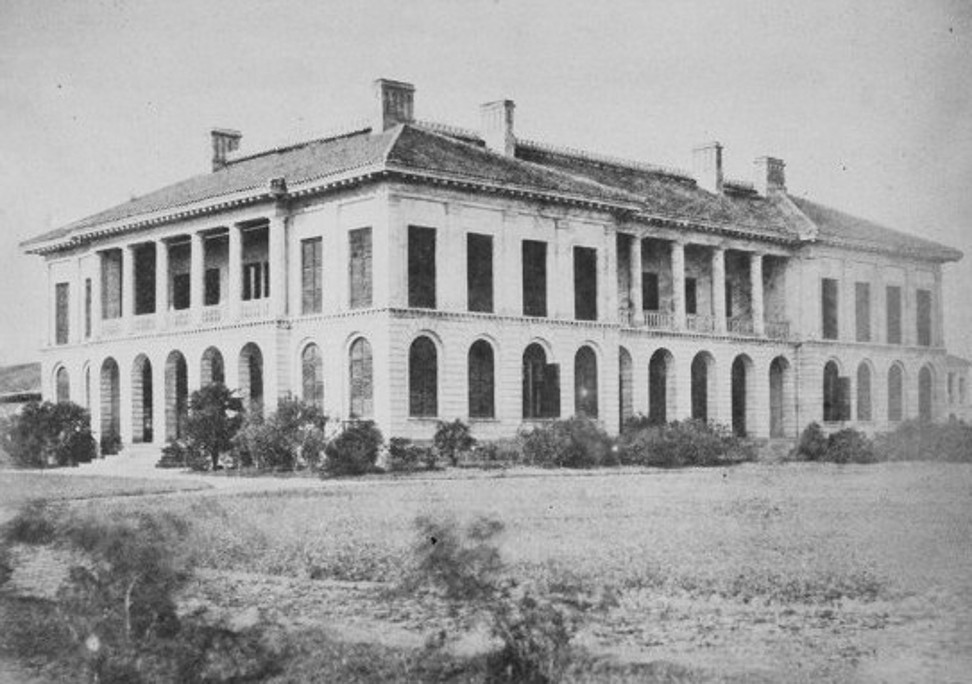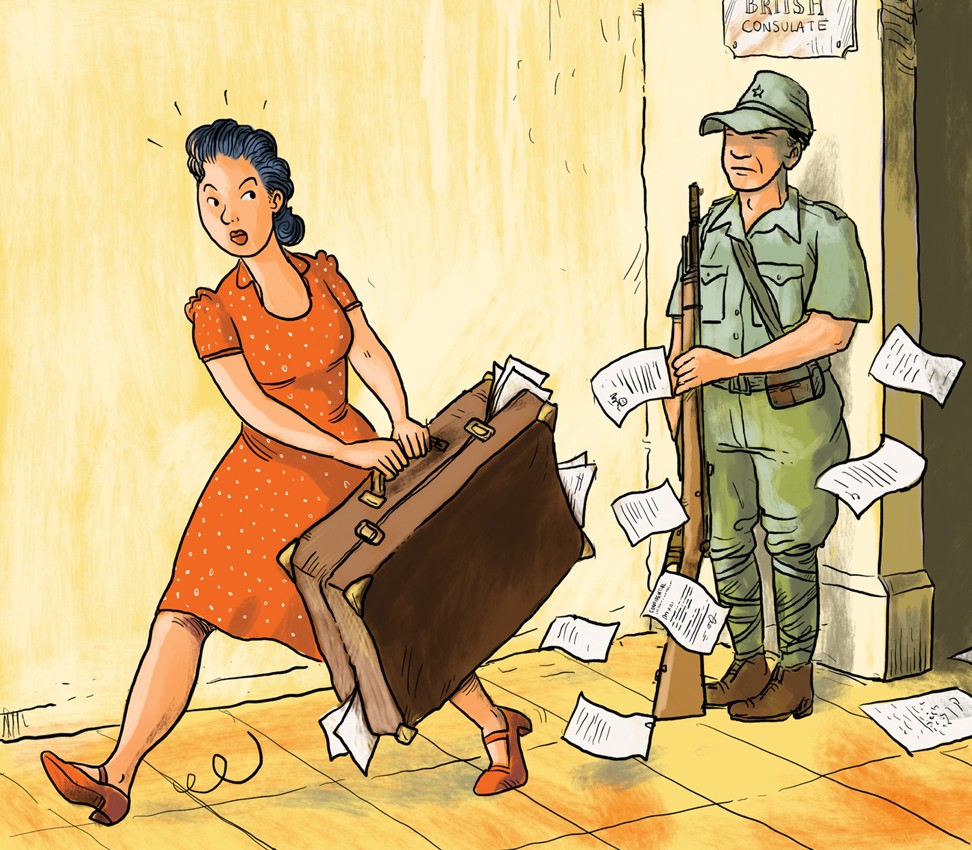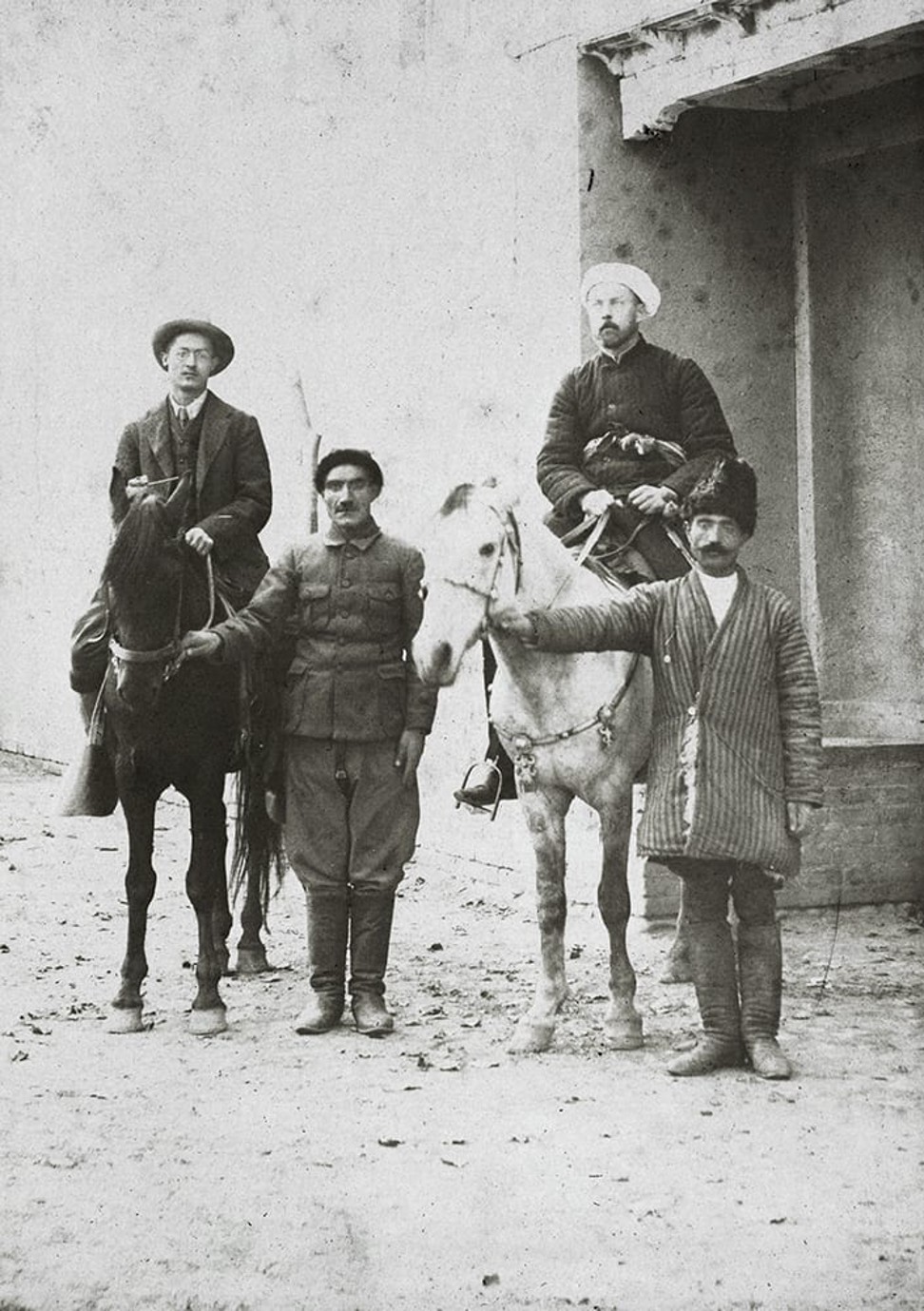
Dead, drunk or driven insane: life for a British consul in pre-1949 China
From 1843 to 1949, the typical British consul’s time in China was beset by social isolation, mental illness, alcoholism and disease, often in ‘alien, remote, and hazardous surroundings’
Wars, floods, murders, terrorism, suicides, revolutions and rebellions, were just a few of the troubles facing British consular officers in volatile pre-communist China, dramas commonly met armed with nothing more than a calm presence and recourse to a pen. Life for a British consul could be a dangerous affair.
By imperial desire, China was a closed society until 1843, when it was forced by treaty to open its borders after its defeat by the British in the first opium war. Before that, foreigners had been largely unwanted and excluded. The country became closed to the world again in 1949, with the founding of the People’s Republic. But in between existed 100 years when a weakened China endured a semicolonial era, with large slices of its major ports and cities given over to foreign rule in the form of concessions and settlements for the purpose of trade, much of it tea to Britain.
Into this newly opened country, the Foreign Office sent its gutsy representatives: the British Consular Service in China, or the “China service” as members fondly referred to themselves.
China was never an easy ride. In the early years, consular work involved an element of unintentional pioneering. Later it was often a case of simply surviving. Travel through this “medieval” country, as many Europeans described it, often involved traversing immense distances over or around deserts, mountains, plains, coasts and seas, through baking sun and freezing winds.
Recruits came largely from minor public schools. They were the sons of doctors, merchants and army officers. Many were attracted by the exotic lure of the Orient, others pushed by a lack of prospects at home, or a desire, as one retired consul described it, “to avoid the drabness of commuting each day to work on a train, wearing a bowler hat”.
Candidates who passed an entrance exam in London were sent on the long sea journey for training in Peking. One such recruit in the 1880s recalled steamships as far as Shanghai (with a change at Colombo, Sri Lanka). Thereafter the transport got smaller: a crowded coastal steamer to Tientsin (now Tianjin), followed by a Chinese junk up river to Tungchow (Tongzhou). The last 15km to the walls of Peking were covered inelegantly astride a donkey (the rail line did not arrive until much later).

Ensconced within Peking’s eight-hectare British Legation compound and provided with their own native tutor, they would spend two years learning Chinese, with varying degrees of success, before being posted far and wide to represent His or Her Majesty’s Government in often remote, unsavoury and unhealthy corners of China.
Patrick Coates, who, aged 20, was a latecomer to the service in 1936, recalled being warned how “one in four would die young, one would take to drink, one would go mad and only the fourth would survive to become a consul general”.
In the 1970s, a retired Coates wrote a history of the service, The China Consuls (Oxford University Press, 1988). Some of the correspondence generated, and now archived at the University of London’s School of Oriental and African Studies, provides a candid insight into the duties of consular life.
Snippets from both Coates’ book and his correspondence are revealing.
“We did everything,” wrote one former colleague. “Expel British subjects of fancy religious or political convictions who threatened happy relations between British and Chinese; witness executions, luckily a thing of past; patch up matrimonial disputes; perform as coroners and investigate suicides and sudden deaths; look after and occasionally rescue missionaries; repair the ravages of licentious soldiery; restrain lunatics; prosecute keepers of gambling houses; extricate drunks from cathouses; settle strikes; dissuade bigamists from marriage; repair graveyards; give dinner parties for bishops.”
Murder in Peking — two hot takes on a grisly 1937 cold case involving British teen
Conscientiously fulfilling the role of impartial judge could create tensions with local British subjects, who thought cases ought to always go their way. “Though [consuls] tried to exercise perfect justice, the courts were said by some to lean in favour of the Chinese. [They] were often branded by the British communities as ‘pro-Chinese’,” noted the former colleague. Being a part-time judge could be a thankless task.
Living conditions. Sometimes rough: no electricity, no ice, no Colman’s mustard, no Lipton’s tea. In some posts, no mail for months on end, thunderboxes [dry toilets], civil wars and bandits. In spite of it all, I enjoyed every post I was in and had a lot of fun
The Consular Service was a man’s job; women were not employed. They did feature as wives, but there were conditions. Choosing a wife from the troublesome missionary community was “not well thought of” and “ill-advised”, wrote Coates, which was unfortunate as it ruled out nearly half the foreign population of China.
Worse still was choosing a Chinese wife, which was entirely unacceptable. In 1908, one young consul declined to return home on leave, instead rebelliously “going no further than Hong Kong, where he was discovered with a Chinese wife. Unrepentant, he explained that he liked the Chinese, had nothing to go home for, and by his marriage was irrevocably committing himself to China”, wrote Coates. His actions confirmed the end of his Foreign Office career.
Interracial marriage was widely condemned by both foreigners and Chinese alike.
“The trouble with the marriages of those days was, I suppose, that it was impossible to marry anyone but a low-class woman because upper-class women were totally inaccessible; and perhaps it was not untypical of Foreign Office ways that mixed marriages were categorically banned for the first time just when it was becoming possible for consular officers to meet Chinese women of good social position,” reported one former consul.

Nevertheless, Coates counted five mixed marriages during the China service’s 100-year history. Plus more than a few suggestions of common-law arrangements, with one consul on his death, in 1906, leaving the huge sum of £1,700 to “a Chinese lady” in Hong Kong.
Even “acceptable” wives could make or break a man’s career prospects, especially if they proved “difficult”. In the 1920s, one senior man’s spouse hated China to the extent that she would deliberately dress poorly for social events – a major transgression – in an effort to cause trouble that would get her husband sent home. Another would take in paying guests at the consulate, forcing visiting colleaguesto find a hotel. She would also refuse at the last moment to return to China after leave in Britain, forcing her husband to make other arrangements for her and sail on alone, only for her to change her mind and catch the next boat after all.
Other wives, however, proved pillars of support: one skilfully drew the detailed maps that accompanied her husband’s intelligence reports, Coates noted. Another (unofficially) helped with the typing and ciphering of confidential messages, and later, on the day of the attack on Pearl Harbor, with her husband sick in bed, entered the Changsha consulate, which was surrounded by unsuspecting Japanese soldiers, filled a suitcase with confidential documents and walked boldly out again in order to burn the contents safely out of enemy sight.

By today’s standards, consuls’ widows were dealt with shabbily, no matter how long their husbands had served. Even as late as the 1930s: “If a man died in harness, his wife and family would be shipped home with all their effects and one year’s salary and allowances, but no further payments,” a former colleague related. During the previous decade members had set up and paid into a widows’ scheme of their own, but it soon collapsed and went bankrupt. Thereafter, “I suppose we hoped it would not happen to us”.
Excessive alcohol consumption was common. One retired colleague described to Coates how “A was fine until 10 a.m., after which not,” and that “B had no option but to become a teetotaller; once he started he simply could not stop”.
Some drank in isolation, others frequented the club bar possessed by seemingly every outpost, no matter how small. Another described how “the effect of prolonged years in China with our first leaves spaced three or more years apart, can be distinguished by a degree of alcoholism and idiosyncrasies, usually amiable, amounting in the long run to some degree of abnormality”.

Alcohol again featured in a 1938 case in which a China consul of 15 years’ service had “threatened to commit suicide in the river at Shanghai when passed over for a post”. A fellow former consul related how he had “talked him out of jumping by saying that he had, after all, blotted his copybook; that being passed over was a frequent occurrence; and his 12-year-old son, to whom he was devoted [his wife had left him], should not be left to think him a coward who could not face up to things”.
That was as kind as kind words got during the period. After some persuasion, the Foreign Office showed unusual sympathy by posting this individual to another continent, where he soon got into a drunken fracas in a nightclub with a German who had made derogatory remarks about the British. He was “removed to bed by friends, only to return to the nightclub in pyjamas to continue the fracas. After which his services were terminated”.
How Chinese bandits’ kidnapping of a blond British bride and her pet dogs became a global news story
Mental illness also took a direct toll in lives. At the consulate in Chinkiang (Zhenjiang) in 1923, “Mrs C called up to her husband that the meal was waiting. He called back that he was coming, there was a heavy thud, and he was found to have cut his throat,” wrote Coates. Given his character, his colleagues were not entirely surprised at the news.
Of fewer than 90 China service entrants from 1897 to 1920, five committed suicide, which does not include the hidden face-saving examples, such as “accidental death by drowning [that] was in fact a suicide”.
Disease accounted for others: typhus, malaria and influenza together saved the Treasury a fortune in pensions. Consuls dying in post was perhaps viewed by the Foreign Office as a regrettable but unavoidable hazard.
One of our old consuls was found trembling on a Shanghai pavement, not daring to face the traffic. He had just come down the Yangtze from Chungking, where he was awarded the Albert Medal for having interposed his consular and rather portly presence between two armies about to open fire
For financial reasons, however, it took a dim view of members volunteering for war service: “D was permitted to resign in order to join up in 1914 and was killed soon after he went to France. Then the Foreign Office got cold feet and would not let anyone else go, even people who had only been in the service for a year and had not wasted much money. E was reading law [in London] and when the Foreign Office heard that he had joined the Inns of Court Volunteers, they pulled him out, and sent him not back to China, but to Java, where he had little to do but watch his own promotion to Captain and Major. He told me that if the war had only lasted a few more years he might have finished a Field Marshal,” one retired consul told Coates.
Eccentricity abounded and indeed may have helped some cope with the conditions. “F was my first consul general, and in retrospect I find him an interesting personality. He did no entertaining, the staff never entered his house and he seemed to have no occupation in the office beyond studying ‘Who’s Who’ interminably. [But] he achieved the notable feat of predicting correctly which of the Szechwan warlords [of the 1920s] would eventually come out on top. He taught us a good deal, but personal contact was entirely lacking,” the same man noted.
Disenchanted with low pay and slow promotion, some China service members jumped ship for the far better money offered by trading companies. “One had always realised what a dreadful shambles the whole thing was,” an ex-member wrote to Coates, only partly tongue-in-cheek. “A service of s**ts run by s**ts”, were the stronger words chosen to describe it by a disgruntled other.

But many stayed, either out of loyalty or affection for the China service itself, or a love of China and the unique life it offered. As one former member fondly recalled of his time there in the 1920s: “Living conditions. Sometimes rough: no electricity, no ice, no Colman’s mustard, no Lipton’s tea. In some posts, no mail for months on end, thunderboxes [dry toilets], civil wars and bandits. In spite of it all, I enjoyed every post I was in and had a lot of fun. Some of my colleagues would disagree. The climate was usually tolerable to good, from tropical to arctic.
“The life sounds more hazardous than it really was, and our mortality statistics must be much more favourable than those of, say, dockers, or labourers on building sites. However, we did see a lot of excitement, and were sometimes stoned or shot at, and in one or two places got away in the nick of time. Later we had bombs. But we used to say that no bandit did you any harm unless he was aiming at someone else.
The Lone Flag: Macau's WWII British consul
“So as for ‘alien, remote, and hazardous surroundings,’ I would comment: alien but delightful and absorbing; remote, yes, but what is better for a consul than to be as far as possible from his diplomatic mission, and if possible out of communication? Hazardous, yes and no. New York was worse. One of our old consuls was found trembling on a Shanghai pavement, not daring to face the traffic. He had just come down the Yangtze from Chungking [Chongqing], where he was awarded the Albert Medal for having interposed his consular and rather portly presence between two armies about to open fire. So hazards are relative.”
In 1943, as a concession to its wartime ally, the British government agreed to the end of extraterritoriality in China. As a result of a treaty of that year, the foreign settlements and concessions, with all their privileges and prime real estate, disappeared with the stroke of a pen. Post-war cost savings twinned with Foreign Office organisational restructuring saw an end to the China service as a separate entity. Following the victory of the communists in 1949, foreign consular staff were no longer welcome in China and effectively expelled from the country. The Foreign Office, however, had no need after the communist assumption of power to withdraw the acting consul in Peking. Aged 31, true to tradition, he had recently died in post.
